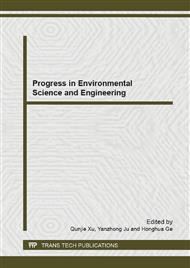p.3789
p.3797
p.3803
p.3809
p.3814
p.3821
p.3826
p.3832
p.3837
Scenario Analysis in Coastal Wetland Development: a Case Study in Xiangshan Bay
Abstract:
At present, coastal wetland in China is seriously affected by expansion of coastal cities and industrial areas. Xiangshan Bay of Ningbo, Zhejiang Province is a famous seafood production base, with a title of “Big Fish Pond” in East Sea. However, it have been facing serious problems, such as industrial pollution, marine eutrophication, and biological invasion. Recently, local government approved a number of industrial and tourism projects in order to improve economy. So it is forecasted with a rapid expansion of manufacturing and tourism in next 5~10 years. Combined with the planned projects, scenario analysis was conducted in this paper, so that we can inspect the effects of different scenarios. Potential Class (PC) and Sustainability Class (SC) were constructed based on the data of investigation and remote sensing image of 2009, as a tool to assess scenarios. PC is evaluation criterion of economic benefit and social benefit, while SC is of ecological benefit and environmental benefit. Among all scenarios, combination of agriculture and tourism in coastal wetlands is optimizing for Xiangshan Bay. According to the study, eco-tourism should be promoted and existing wetland agriculture should be ecologically improved. It is also necessary to restrict the secondary industry to ensure ecological protection and tourism growth.
Info:
Periodical:
Pages:
3826-3831
Citation:
Online since:
December 2012
Authors:
Keywords:
Price:
Сopyright:
© 2013 Trans Tech Publications Ltd. All Rights Reserved
Share:
Citation:


